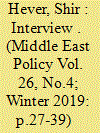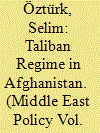|
|
|
Sort Order |
|
|
|
Items / Page
|
|
|
|
|
|
|
| Srl | Item |
| 1 |
ID:
172023


|
|
|
|
|
| Summary/Abstract |
Algeria seemed to avoid large‐scale uprisings against autocratic regimes when its neighbors were facing unrest. Yet massive protests broke out in February 2019 at Abdelaziz Bouteflika's announcement of his candidacy for a fifth term as president. This article argues that, although many factors associated with Algerian politics reduced the chances for mass protests in 2011, other factors increased in significance between 2011 and 2019, such as Bouteflika's stroke in 2013 and constitutional amendments in 2016, adding to the anti‐regime pressure that prompted the 2019 rebellion.
|
|
|
|
|
|
|
|
|
|
|
|
|
|
|
|
| 2 |
ID:
172019


|
|
|
|
|
| Summary/Abstract |
In the last several years, contact between Azerbaijan and Iran has increased dramatically, and several delegations have exchanged visits. Some have included top military and intelligence brass. For example, in January 2019, the chief of the Iranian general staff visited Baku, where he signed various documents ensuring military cooperation between his country and Azerbaijan. He also emphasized the territorial integrity of Azerbaijan. This might not indicate dramatic changes in Iranian‐Azerbaijani relations. Nor does it suggest that Azerbaijan will sever its ties with the United States or Israel, both countries seen in Tehran as mortal enemies. Azerbaijan would clearly try to sit on two, or many, chairs at the same time.
|
|
|
|
|
|
|
|
|
|
|
|
|
|
|
|
| 3 |
ID:
172017


|
|
|
|
|
| Summary/Abstract |
There is no doubt that the EU has significant potential when it comes to soft power. As mentioned in the EUGS, the EU is the primary trading partner and foreign investor for most countries around the globe. The EU member states together invest more in development cooperation than the rest of the world combined: promoting job opportunities, inclusive societies, human rights, peace building and the resilience of states and societies. These elements of EU policies sum up the traditional understanding of the union as a soft power, and to some extent also its self‐perception. However, as indicated by Mogherini, in recent years this self‐perception has been undergoing changes.
|
|
|
|
|
|
|
|
|
|
|
|
|
|
|
|
| 4 |
ID:
172022


|
|
|
|
|
| Summary/Abstract |
There is something puzzling about the failure of the Syrian revolution. One argument attributes it to the strength and resources of the Assad regime, which enjoyed the support of nearly all Syria's minorities (Alawites, Christians, Druze, Ismailis and Shia), who make up at least 20–25 percent of the population. The Kurds, a large minority (around 10 percent), remained neutral and never joined the opposition; they had their own political aspirations. The regime held on to the firm loyalty of its core elites and armed forces despite a few scattered defections. This was crucial for a government that mainly relied on coercion for control.1 Finally, the regime had very few, but committed, allies — Iran, Russia and Hezbollah — who ensured a continuous supply of money, arms and fighters. These combined factors explain why the revolutionary forces had great difficulty overthrowing the regime.
|
|
|
|
|
|
|
|
|
|
|
|
|
|
|
|
| 5 |
ID:
172015


|
|
|
| 6 |
ID:
172016


|
|
|
|
|
| Summary/Abstract |
South Sudan, composed originally of 10 states populated by more than 12 million inhabitants of numerous ethnicities and languages and practicing mostly an animist or Christian faith, received its independence from predominantly Arab and Sunni Muslim Sudan on July 9, 2011, becoming the fifty‐fourth sovereign country in Africa. Following decades of conflict and a referendum, it is only one of two political entities on the continent that has successfully seceded from another country and been universally recognized as a sovereign state (Eritrea being the other) since the period of European decolonization (Ghana in 1957 to Zimbabwe in 1980) and Namibia's independence from Apartheid South Africa in 1990.1 However, despite sizable oil deposits and other natural resources as well as fertile land, South Sudan's population suffers from a lack of education and health care as well as food shortages and extreme poverty.
|
|
|
|
|
|
|
|
|
|
|
|
|
|
|
|
| 7 |
ID:
172018


|
|
|
|
|
| Summary/Abstract |
Since Donald J. Trump took the White House in January 2017, relations between the United States and the Islamic Republic of Iran have significantly deteriorated. Washington withdrew from the nuclear deal (Joint Comprehensive Plan of Action, or JCPOA) and adopted a “maximum pressure” strategy that employs unprecedented economic and diplomatic sanctions. Initially, Tehran sought not to overreact to this pressure and to work with other global powers like the European Union, Russia and China in what is labeled “strategic patience diplomacy.”
|
|
|
|
|
|
|
|
|
|
|
|
|
|
|
|
| 8 |
ID:
172020


|
|
|
|
|
| Summary/Abstract |
In 2017–18, Russia's Rosneft made a dramatic entrance into the oil and gas sector of the Kurdistan Region of Iraq (KRI) by signing up to $5.3 billion worth of deals with the Kurdistan Regional Government (KRG). The KRG was facing economic problems and, at the same time, had long desired to develop its stagnant gas sector. Russia, having only a limited foothold in post‐2003 Iraq, has become an important player in the KRI energy sector. This step came at a time when many argued that Russian engagement in the Middle East and North Africa (MENA) “was essentially part of Moscow's endeavor to return to the global geopolitical chessboard as a great power.”1 It appears that one element of its actions across the region stands out: a systematic effort to play a part in gas projects that otherwise have the potential to undermine Russian dominance in supplying Europe with gas. Rosneft seems to be a principal agent in this undertaking.
|
|
|
|
|
|
|
|
|
|
|
|
|
|
|
|
| 9 |
ID:
172024


|
|
|
|
|
| Summary/Abstract |
On April 4, 2019, Field Marshal Khalifa Haftar launched a military strike against Tripoli, the Libyan capital and the headquarters of the internationally recognized, UN‐sponsored Government of National Accord (GNA), headed by Fayez al‐Serraj.1 The attack was a clear sign of the field marshal's intention to challenge the GNA through military means, take control of the entire country and impose himself as the undisputed leader of post‐2011 Libya. In 2014, with the launch of Operation Karamah (Dignity), Haftar and his self‐styled Libyan National Army (LNA) took control over Cyrenaica, Libya's eastern region, and from there expanded south. In summer 2018, most of Fezzan, the southern Libyan province, was brought under his control.2 Tripolitania, Libya's western region, was the last piece of the puzzle — the most populous and difficult to subjugate. Six months after the launch of the military offensive, what was envisioned as a quick victory turned into a yet‐unresolved, low‐intensity conflict between Libyan parties as well as regional and international actors.
|
|
|
|
|
|
|
|
|
|
|
|
|
|
|
|
| 10 |
ID:
172021


|
|
|
|
|
| Summary/Abstract |
The Taliban sat at the negotiating table with the Afghan opposition in Moscow in February 2019. Although Ashraf Ghani, the current president of the country, refused to be there and criticized the negotiations, the Taliban and the current regime's opposition — including Hamid Karzai — made important decisions on bringing peace and stability to Afghanistan. If the negotiations conclude as expected, the most important outcome would be for the Taliban to continue as a legitimate actor in Afghan politics. The basic issues between the two sides are for American soldiers to withdraw from Afghan soil and for the Taliban to cease hosting terror groups like al‐Qaeda. While the Taliban seemed to soften its radical views on women's rights, it demanded a release of prisoners and the removal of Taliban members from the sanctions lists.
|
|
|
|
|
|
|
|
|
|
|
|
|
|
|
|
| 11 |
ID:
172014


|
|
|
|
|
| Summary/Abstract |
With Lebanon and Iraq being embroiled in protests, and with Syria and Yemen entering yet a new phase in their internal conflicts, supported by external players, the Israel‐Palestine issue is no longer a headline story in the Middle East. Here in America, when the story gets mentioned at all, it's the long, drawn‐out soap opera we call the dysfunctional Israeli political system. Who's on first? Who's on second? Is it going to happen? What does it take to make it happen — as if it actually made a difference in terms of whether there was peace and justice for Palestinians, which it does not.
|
|
|
|
|
|
|
|
|
|
|
|
|
|
|
|
|
|
|
|
|